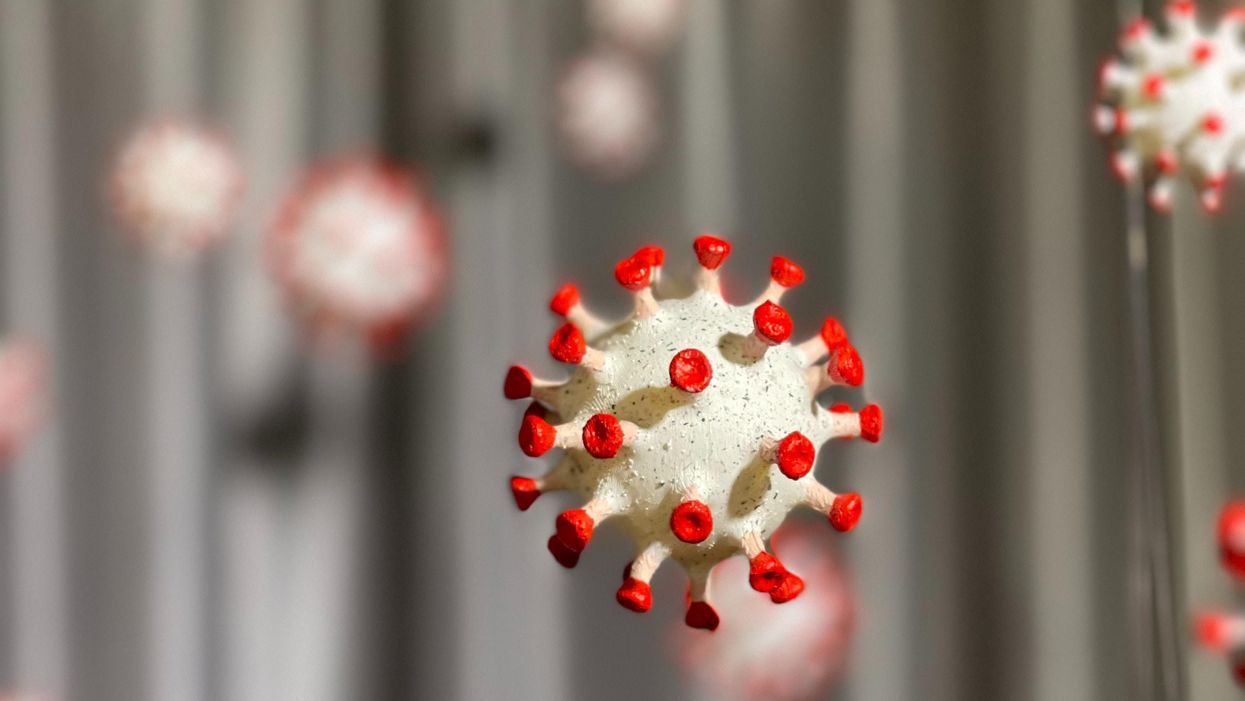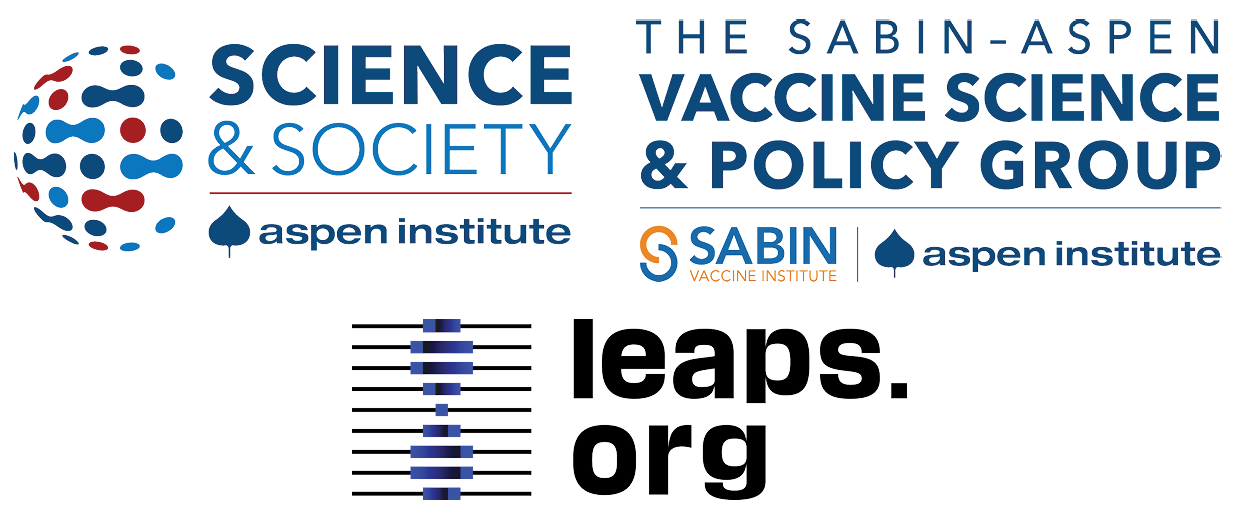Dec. 17th Event: The Latest on Omicron, Boosters, and Immunity
Kira Peikoff was the editor-in-chief of Leaps.org from 2017 to 2021. As a journalist, her work has appeared in The New York Times, Newsweek, Nautilus, Popular Mechanics, The New York Academy of Sciences, and other outlets. She is also the author of four suspense novels that explore controversial issues arising from scientific innovation: Living Proof, No Time to Die, Die Again Tomorrow, and Mother Knows Best. Peikoff holds a B.A. in Journalism from New York University and an M.S. in Bioethics from Columbia University. She lives in New Jersey with her husband and two young sons. Follow her on Twitter @KiraPeikoff.

The Omicron variant poses new uncertainty for the vaccines, which four leading experts will address during our virtual event on December 17th, 2021.
This virtual event will convene leading scientific and medical experts to discuss the most pressing questions around the new Omicron variant, including what we know so far about its ability to evade COVID-19 vaccines, the role of boosters in eliciting heightened immunity, and the science behind variants and vaccines. A public Q&A will follow the expert discussion.
EVENT INFORMATION:
Date: Friday Dec 17, 2021
2:00pm - 3:30pm EST

Dr. Céline Gounder, MD, ScM, is the CEO/President/Founder of Just Human Productions, a non-profit multimedia organization. She is also the host and producer of American Diagnosis, a podcast on health and social justice, and Epidemic, a podcast about infectious disease epidemics and pandemics. She served on the Biden-Harris Transition COVID-19 Advisory Board.
 Dr. Theodora Hatziioannou, Ph.D., is a Research Associate Professor in the Laboratory of Retrovirology at The Rockefeller University. Her research includes identifying plasma samples from recovered COVID-19 patients that contain antibodies capable of neutralizing the SARS-CoV-2 coronavirus.
Dr. Theodora Hatziioannou, Ph.D., is a Research Associate Professor in the Laboratory of Retrovirology at The Rockefeller University. Her research includes identifying plasma samples from recovered COVID-19 patients that contain antibodies capable of neutralizing the SARS-CoV-2 coronavirus.

Dr. Onyema Ogbuagu, MBBCh, is an Associate Professor at Yale School of Medicine and an infectious disease specialist who treats COVID-19 patients and leads Yale’s clinical studies around COVID-19. He ran Yale’s trial of the Pfizer/BioNTech vaccine.

Dr. Eric Topol, M.D., is a cardiologist, scientist, professor of molecular medicine, and the director and founder of Scripps Research Translational Institute. He has led clinical trials in over 40 countries with over 200,000 patients and pioneered the development of many routinely used medications.
This event is the fourth of a four-part series co-hosted by Leaps.org, the Aspen Institute Science & Society Program, and the Sabin–Aspen Vaccine Science & Policy Group, with generous support from the Gordon and Betty Moore Foundation and the Howard Hughes Medical Institute.

Kira Peikoff was the editor-in-chief of Leaps.org from 2017 to 2021. As a journalist, her work has appeared in The New York Times, Newsweek, Nautilus, Popular Mechanics, The New York Academy of Sciences, and other outlets. She is also the author of four suspense novels that explore controversial issues arising from scientific innovation: Living Proof, No Time to Die, Die Again Tomorrow, and Mother Knows Best. Peikoff holds a B.A. in Journalism from New York University and an M.S. in Bioethics from Columbia University. She lives in New Jersey with her husband and two young sons. Follow her on Twitter @KiraPeikoff.
Studies of twins have played an important role in determining that genetic differences play a role in the development of differences in behavior.
[Editor's Note: This essay is in response to our current Big Question, which we posed to experts with different perspectives: "How should DNA tests for intelligence be used, if at all, by parents and educators?"]
Imagine a world in which pregnant women could go to the doctor and obtain a simple inexpensive genetic test of their unborn child that would allow them to predict how tall he or she would eventually be. The test might also tell them the child's risk for high blood pressure or heart disease.
Can we use DNA not to understand, but to predict who is going to be intelligent or extraverted or mentally ill?
Even more remarkable -- and more dangerous -- the test might predict how intelligent the child would be, or how far he or she could be expected to go in school. Or heading further out, it might predict whether he or she will be an alcoholic or a teetotaler, or straight or gay, or… you get the idea. Is this really possible? If it is, would it be a good idea? Answering these questions requires some background in a scientific field called behavior genetics.
Differences in human behavior -- intelligence, personality, mental illness, pretty much everything -- are related to genetic differences among people. Scientists have known this for 150 years, ever since Darwin's half-cousin Francis Galton first applied Shakespeare's phrase, "Nature and Nurture" to the scientific investigation of human differences. We knew about the heritability of behavior before Mendel's laws of genetics had been re-discovered at the end of the last century, and long before the structure of DNA was discovered in the 1950s. How could discoveries about genetics be made before a science of genetics even existed?
The answer is that scientists developed clever research designs that allowed them to make inferences about genetics in the absence of biological knowledge about DNA. The best-known is the twin study: identical twins are essentially clones, sharing 100 percent of their DNA, while fraternal twins are essentially siblings, sharing half. To the extent that identical twins are more similar for some trait than fraternal twins, one can infer that heredity is playing a role. Adoption studies are even more straightforward. Is the personality of an adopted child more like the biological parents she has never seen, or the adoptive parents who raised her?
Twin and adoption studies played an important role in establishing beyond any reasonable doubt that genetic differences play a role in the development of differences in behavior, but they told us very little about how the genetics of behavior actually worked. When the human genome was finally sequenced in the early 2000s, and it became easier and cheaper to obtain actual DNA from large samples of people, scientists anticipated that we would soon find the genes for intelligence, mental illness, and all the other behaviors that were known to be "heritable" in a general way.
But to everyone's amazement, the genes weren't there. It turned out that there are thousands of genes related to any given behavior, so many that they can't be counted, and each one of them has such a tiny effect that it can't be tied to meaningful biological processes. The whole scientific enterprise of understanding the genetics of behavior seemed ready to collapse, until it was rescued -- sort of -- by a new method called polygenic scores, PGS for short. Polygenic scores abandon the old task of finding the genes for complex human behavior, replacing it with black-box prediction: can we use DNA not to understand, but to predict who is going to be intelligent or extraverted or mentally ill?
Prediction from observing parents works better, and is far easier and cheaper, than anything we can do with DNA.
PGS are the shiny new toy of human genetics. From a technological standpoint they are truly amazing, and they are useful for some scientific applications that don't involve making decisions about individual people. We can obtain DNA from thousands of people, estimate the tiny relationships between individual bits of DNA and any outcome we want — height or weight or cardiac disease or IQ — and then add all those tiny effects together into a single bell-shaped score that can predict the outcome of interest. In theory, we could do this from the moment of conception.
Polygenic scores for height already work pretty well. Physicians are debating whether the PGS for heart disease are robust enough to be used in the clinic. For some behavioral traits-- the most data exist for educational attainment -- they work well enough to be scientifically interesting, if not practically useful. For traits like personality or sexual orientation, the prediction is statistically significant but nowhere close to practically meaningful. No one knows how much better any of these predictions are likely to get.
Without a doubt, PGS are an amazing feat of genomic technology, but the task they accomplish is something scientists have been able to do for a long time, and in fact it is something that our grandparents could have done pretty well. PGS are basically a new way to predict a trait in an individual by using the same trait in the individual's parents — a way of observing that the acorn doesn't fall far from the tree.
The children of tall people tend to be tall. Children of excellent athletes are athletic; children of smart people are smart; children of people with heart disease are at risk, themselves. Not every time, of course, but that is how imperfect prediction works: children of tall parents vary in their height like anyone else, but on average they are taller than the rest of us. Prediction from observing parents works better, and is far easier and cheaper, than anything we can do with DNA.
But wait a minute. Prediction from parents isn't strictly genetic. Smart parents not only pass on their genes to their kids, but they also raise them. Smart families are privileged in thousands of ways — they make more money and can send their kids to better schools. The same is true for PGS.
The ability of a genetic score to predict educational attainment depends not only on examining the relationship between certain genes and how far people go in school, but also on every personal and social characteristic that helps or hinders education: wealth, status, discrimination, you name it. The bottom line is that for any kind of prediction of human behavior, separation of genetic from environmental prediction is very difficult; ultimately it isn't possible.
Still, experts are already discussing how to use PGS to make predictions for children, and even for embryos.
This is a reminder that we really have no idea why either parents or PGS predict as well or as poorly as they do. It is easy to imagine that a PGS for educational attainment works because it is summarizing genes that code for efficient neurological development, bigger brains, and swifter problem solving, but we really don't know that. PGS could work because they are associated with being rich, or being motivated, or having light skin. It's the same for predicting from parents. We just don't know.
Still, experts are already discussing how to use PGS to make predictions for children, and even for embryos.
For example, maybe couples could fertilize multiple embryos in vitro, test their DNA, and select the one with the "best" PGS on some trait. This would be a bad idea for a lot of reasons. Such scores aren't effective enough to be very useful to parents, and to the extent they are effective, it is very difficult to know what other traits might be selected for when parents try to prioritize intelligence or attractiveness. People will no doubt try it anyway, and as a matter of reproductive freedom I can't think of any way to stop them. Fortunately, the practice probably won't have any great impact one way or another.
That brings us to the ethics of PGS, particularly in the schools. Imagine that when a child enrolls in a public school, an IQ test is given to her biological parents. Children with low-IQ parents are statistically more likely to have low IQs themselves, so they could be assigned to less demanding classrooms or vocational programs. Hopefully we agree that this would be unethical, but let's think through why.
First of all, it would be unethical because we don't know why the parents have low IQs, or why their IQs predict their children's. The parents could be from a marginalized ethnic group, recognizable by their skin color and passed on genetically to their children, so discriminating based on a parent's IQ would just be a proxy for discriminating based on skin color. Such a system would be no more than a social scientific gloss on an old-fashioned program for perpetuating economic and cognitive privilege via the educational system.
People deserve to be judged on the basis of their own behavior, not a genetic test.
Assigning children to classrooms based on genetic testing would be no different, although it would have the slight ethical advantage of being less effective. The PGS for educational attainment could reflect brain-efficiency, but it could also depend on skin color, or economic advantage, or personality, or literally anything that is related in any way to economic success. Privileging kids with higher genetic scores would be no different than privileging children with smart parents. If schools really believe that a psychological trait like IQ is important for school placement, the sensible thing is to administer the children an actual IQ test – not a genetic test.
IQ testing has its own issues, of course, but at least it involves making decisions about individuals based on their own observable characteristics, rather than on characteristics of their parents or their genome. If decisions must be made, if resources must be apportioned, people deserve to be judged on the basis of their own behavior, the content of their character. Since it can't be denied that people differ in all sorts of relevant ways, this is what it means for all people to be created equal.
[Editor's Note: Read another perspective in the series here.]
A child prodigy considers a math equation.
[Editor's Note: This essay is in response to our current Big Question, which we posed to experts with different perspectives: "How should DNA tests for intelligence be used, if at all, by parents and educators?"]
It's 2019. Prenatal genetic tests are being used to help parents select from healthy and diseased eggs. Genetic risk profiles are being created for a range of common diseases. And embryonic gene editing has moved into the clinic. The science community is nearly unanimous on the question of whether we should be consulting our genomes as early as possible to create healthy offspring. If you can predict it, let's prevent it, and the sooner, the better.
There are big issues with IQ genetics that should be considered before parents and educators adopt DNA IQ predictions.
When it comes to care of our babies, kids, and future generations, we are doing things today that we never even dreamed would be possible. But one area that remains murky is the long fraught question of IQ, and whether to use DNA science to tell us something about it. There are big issues with IQ genetics that should be considered before parents and educators adopt DNA IQ predictions.
IQ tests have been around for over a century. They've been used by doctors, teachers, government officials, and a whole host of institutions as a proxy for intelligence, especially in youth. At times in history, test results have been used to determine whether to allow a person to procreate, remain a part of society, or merely stay alive. These abuses seem to be a distant part of our past, and IQ tests have since garnered their fair share of controversy for exhibiting racial and cultural biases. But they continue to be used across society. Indeed, much of the literature aimed at expecting parents justifies its recommendations (more omegas, less formula, etc.) based on promises of raising a baby's IQ.
This is the power of IQ testing sans DNA science. Until recently, the two were separate entities, with IQ tests indicating a coefficient created from individual responses to written questions and genetic tests indicating some disease susceptibility based on a sequence of one's DNA. Yet in recent years, scientists have begun to unlock the secrets of inherited aspects of intelligence with genetic analyses that scan millions of points of variation in DNA. Both bench scientists and direct-to-consumer companies have used these new technologies to find variants associated with exceptional IQ scores. There are a number of tests on the open market that parents and educators can use at will. These tests purport to reveal whether a child is inherently predisposed to be intelligent, and some suggest ways to track them for success.
I started looking into these tests when I was doing research for my book, "Social by Nature: The Promise and Peril of Sociogenomics." This book investigated the new genetic science of social phenomena, like educational attainment and political persuasion, investment strategies, and health habits. I learned that, while many of the scientists doing much of the basic research into these things cautioned that the effects of genetic factors were quite small, most saw testing as one data point among many that could help to somehow level the playing field for young people. The rationale went that in certain circumstances, some needed help more than others. Why not put our collective resources together to help them?
Good nutrition, support at home, and access to healthcare and education make a huge difference in how people do.
Some experts believed so strongly in the power of DNA behavioral prediction that they argued it would be unfair not to use predictors to determine a kid's future, prevent negative outcomes, and promote the possibility for positive ones. The educators out in the wider world that I spoke with agreed. With careful attention, they thought sociogenomic tests could help young people get the push they needed when they possessed DNA sequences that weren't working in their favor. Officials working with troubled youth told me they hoped DNA data could be marshaled early enough that kids would thrive at home and in school, thereby avoiding ending up in their care. While my conversations with folks centered around sociogenomic data in general, genetic IQ prediction was completely entangled in it all.
I present these prevailing views to demonstrate both the widespread appeal of genetic predictors as well as the well-meaning intentions of those in favor of using them. It's a truly progressive notion to help those who need help the most. But we must question whether genetic predictors are data points worth looking at.
When we examine the way DNA IQ predictors are generated, we see scientists grouping people with similar IQ test results and academic achievements, and then searching for the DNA those people have in common. But there's a lot more to scores and achievements than meets the eye. Good nutrition, support at home, and access to healthcare and education make a huge difference in how people do. Therefore, the first problem with using DNA IQ predictors is that the data points themselves may be compromised by numerous inaccuracies.
We must then ask ourselves where the deep, enduring inequities in our society are really coming from. A deluge of research has shown that poor life outcomes are a product of social inequalities, like toxic living conditions, underfunded schools, and unhealthy jobs. A wealth of research has also shown that race, gender, sexuality, and class heavily influence life outcomes in numerous ways. Parents and caregivers feed, talk, and play differently with babies of different genders. Teachers treat girls and boys, as well as members of different racial and ethnic backgrounds, differently to the point where they do better and worse in different subject areas.
Healthcare providers consistently racially profile, using diagnostics and prescribing therapies differently for the same health conditions. Access to good schools and healthcare are strongly mitigated by one's race and socioeconomic status. But even youth from privileged backgrounds suffer worse health and life outcomes when they identify or are identified as queer. These are but a few examples of the ways in which social inequities affect our chances in life. Therefore, the second problem with using DNA IQ predictors is that it obscures these very real, and frankly lethal, determinants. Instead of attending to the social environment, parents and educators take inborn genetics as the reason for a child's successes or failures.
It is time that we shift our priorities from seeking genetic causes to fixing the social causes we know to be real.
The other problem with using DNA IQ predictors is that research into the weightiness of DNA evidence has shown time and again that people take DNA evidence more seriously than they do other kinds of evidence. So it's not realistic to say that we can just consider IQ genetics as merely one tiny data point. People will always give more weight to DNA evidence than it deserves. And given its proven negligible effect, it would be irresponsible to do so.
It is time that we shift our priorities from seeking genetic causes to fixing the social causes we know to be real. Parents and educators need to be wary of solutions aimed at them and their individual children.
[Editor's Note: Read another perspective in the series here.]

